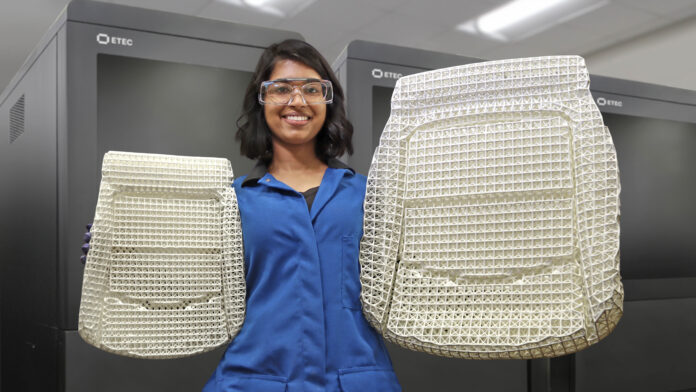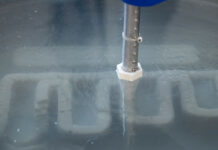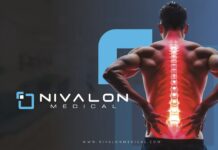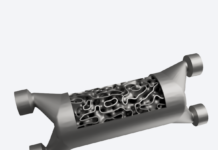Although its use can go beyond the most obvious range of applications, one of the commonly widely used applications of foam is seen in the automotive industry. From car seating to carpet underlay, it plays an important role in both the safety and overall comfort of passengers. Interestingly, it can be adapted, via the formulation used or via the production process, to reach the level of comfort targeted for the car seat, and I am pretty sure that it might be one of the reasons why AM – due to its customizable nature – can play a key part in improving applications based on this material.
As a matter of fact, one company that currently explores this path is Desktop Metal, the AM giant that has acquired a lot of companies over the course of 2021. Its subsidiary Adaptive3D, an expert in photopolymer and elastomer development has developed FreeFoam™, a new family of photopolymer resins that produces durable and dimensionally accurate closed cell foam parts without tooling.
Parts made with FreeFoam are already being manufactured with manufacturers in the automotive and furnishing markets, with broad commercial availability of FreeFoam material slated for 2023, the company says.
“FreeFoam is one of the most exciting and commercially significant photopolymer solutions to come to market in the industrial printing space in years,” said Ric Fulop, Founder and CEO of Desktop Metal. “The market for conventionally manufactured foam has many challenges – from expensive molds that limit designs, to dense and heavy foams that absorb water and are expensive to ship and drive, to the inability to easily dial in strength and Shore hardness values in specific foam designs.”
From a technical standpoint, the company explains that FreeFoam resins are 3D printed similar to other photopolymer resins using DLP. After 3D printing, FreeFoam parts can be expanded on-demand during a brief heating cycle in an oven at approximately 160-170°C (320-340°F). The printed parts contain dispersed heat-activated foaming agents that create closed cell pores inside the material. This highly controllable process causes FreeFoam resins to consistently expand 2 to 7 times their as-printed sizes depending on the grade of resin, achieving final parts within desired tolerances. This all-new process allows 3D printers to produce much larger final foam parts than the printers’ original build areas and will enable foam products to be shipped at compact sizes and expanded at the final point of assembly or commercial use.
Furthermore, the material is part of the recently launched DuraChain™ category of one-part, one-pot photopolymers that delivers breakthrough elastic and tough material properties through a Photo Polymerization-Induced Phase Separation process. When illuminated during DLP printing, these materials phase separate at the nano level into a material that cures into a resilient, high-performance polymer network. DuraChain enables FreeFoam parts to be foamed with control in an oven without a mold.
DM first targets the automotive industry as this foam material can help lightweight cars and trucks while preserving the performance and comfort expected in foam seating. Other industries that can benefit from the advantages of foam & AM include furnishing, footwear, sporting goods, and health care.
Remember, you can post job opportunities in the AM Industry on 3D ADEPT Media free of charge or look for a job via our job board. Make sure to follow us on our social networks and subscribe to our weekly newsletter : Facebook, Twitter, LinkedIn & Instagram ! If you want to be featured in the next issue of our digital magazine or if you hear a story that needs to be heard, make sure you send it to contact@3dadept.com






